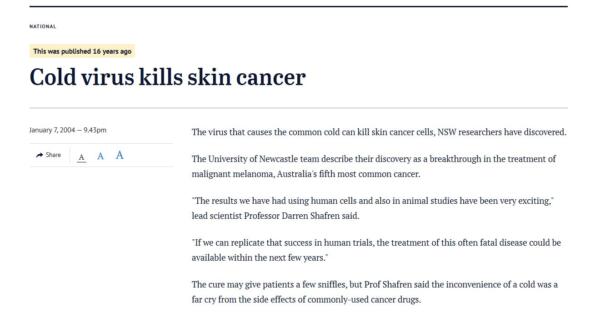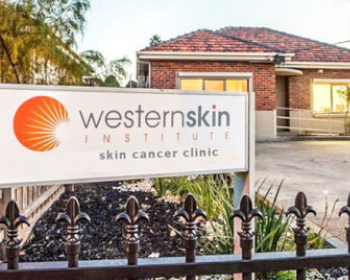On 14th October 2020, Queensland researchers made a breakthrough in the treatment of basal cell carcinoma by using a genetically engineered cold virus to kill the tumour. This led to multiple headlines across the media; from the ABC, to the New York Post. No doubt, such headlines will lead to a deluge of phone calls to Dermatologists, General Practitioners and Surgeons. This blog is written to provide straight talk on the above.
How does the treatment work?
Tumours form a barrier to the immune system. This is why although cancers are foreign, the body does not detect and destroy them. However, if there is a way to break this barrier and induce the immune system to react against the cancer, the body stands a fighting chance. In the particular example above, the virus is encoded with a gene for gamma interferon, a protein the body uses to fight cancers. It is thought that by using the virus as a vector, delivery of this protein can help activate the body’s immune system to destroy the cancer.
How new is this form of breakthrough treatment?
NOT NEW. Here is a link to an article from The Age 16 years ago: https://www.theage.com.au/national/cold-virus-kills-skin-cancer-20040107-gdx2ju.html

Here is another article of the cold virus used to fight brain cancer in 2015: https://www.mdanderson.org/publications/conquest/unleashing-the-cold-virus-to-kill-cancer.h4236-1589835.html
Here is another one using the cold sore virus: https://www.bbc.com/news/av/health-32895401
The list goes on.
Why has this not been used in mainstream medicine?
For a medication or vaccine to be accepted into mainstream medicine, it must undergo approval. The FDA (Food and Drug Administration) is the world’s regulating body for approval of a medication. The steps required to achieve this review are very extensive as shown below:
- Preclinical (animal) testing.
- An investigational new drug application (I-NDA) outlines what the sponsor of a new drug proposes for human testing in clinical trials.
- Phase 1 studies (typically involve 20 to 80 people).
- Phase 2 studies (typically involve a few dozen to about 300 people).
- Phase 3 studies (typically involve several hundred to about 3,000 people).
- The pre-NDA period, just before a new drug application (NDA) is submitted. A common time for the FDA and drug sponsors to meet.
- Submission of an NDA is the formal step asking the FDA to consider a drug for marketing approval.
- Review of NDA – After an NDA is received, the FDA has 60 days to decide whether to file it so it can be reviewed.
- Filing of NDA – If the FDA files the NDA, an FDA review team is assigned to evaluate the sponsor’s research on the drug’s safety and effectiveness.
- Review of labelling – The FDA reviews information that goes on a drug’s professional labelling (information on how to use the drug).
- Facility inspection – The FDA inspects the facilities where the drug will be manufactured as part of the approval process.
- Approval – FDA reviewers will approve the application or issue a complete response letter.
Approximately 88% of medicines/ vaccines do not make it past this approval process. Why? The simple answer is to protect YOU, the patient. A drug that may seem to work in theory may not work in reality. Remember Trump and hydroxychloroquine? There is no evidence that hydroxychloroquine works in coronavirus infected patients (https://www.nejm.org/doi/full/10.1056/NEJMoa2022926?query=recirc_mostViewed_railB_article) – it simply failed the rigorosity of scientific evaluation.
Can you give me that virus treatment anyway?
It is illegal to prescribe medications that are experimental, that are not subject to clinical trials and their results are not published in peer-reviewed literature.
Concluding remarks and tips
The media has a habit of sensationalising news. Often times, they fail to mention the phase of the clinical trial that medication is in. News like the above will continue to arise. The work of the investigators in Brisbane are noteworthy. The medical community needs researchers to advance medicine. However, until their results have undergone extensive testing and scrutiny in peer-reviewed literature, it is too early to conclude on its effectiveness.
What is the best treatment for skin cancer?
Prevention is better than cure. This involves sun protection and sunscreen use, regular self-skin examination and early presentation to your doctor or dermatologist if you have a concern.





